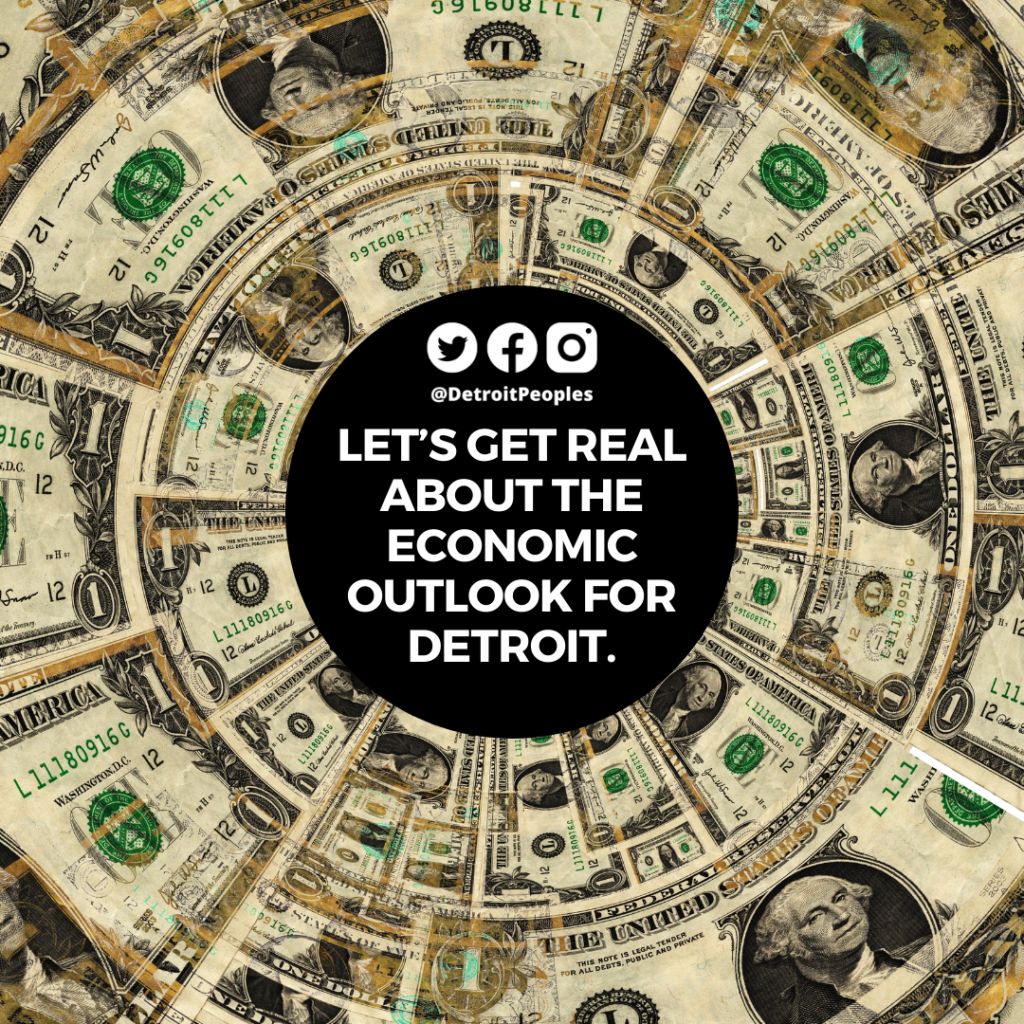Let’s Get Real about the Economic Outlook for Detroit.
The City of Detroit just held its biannual Revenue Estimating Conference where it presented a broad and positive economic outlook for Detroit, stating that municipal revenue “continues to improve, thanks to strength of income tax and continuing efforts driving economic opportunity and growth for Detroiters.”(1)
While income tax revenue is growing and economic opportunities are seemingly expanding, most Detroiters are still losing and here’s why.
Detroit’s primary approach to economic development is to give tax breaks to big developers who, in return, bring jobs to the City. So, instead of taxing wealthy land developers with them paying their fair share of property taxes, the City taxes individuals using income tax.
So, what’s the problem with this approach?
For one, it shifts the heavy revenue burden from rich corporations to regular, everyday working folks like you and me. Last year workers paid around $233 million in income tax to the City while rich corporations paid $37 million (2).
As a result, the average Detroiter is shortchanged as more money is sucked from our paychecks, thus making it harder to pay rent, utilities, and other living expenses. And at the same time, we lose the public investments for our schools, libraries, parks, and recreation centers that rich developers should be paying in property tax. From 2017 to 2020, the City lost more than $135 million in City revenue from tax incentive programs and tens of millions more in Downtown tax increment financing (3).
Second, as a result of this backwards taxation, the City’s number one revenue source is, you guessed it, INCOME TAX, and not property tax like in most cities. This makes the City’s financial situation much more unstable because employment and labor markets are more erratic than real estate and property values.
This is why Detroit was hit so harder during the pandemic. In 2020 and 2021, the City lost $400 million in expected revenue and nearly $110 million of that was due to losses in municipal income tax (4).
And while jobs are growing, the high paying jobs aren’t going to Detroiters, they are going to suburbanites. The average wage for all jobs in Detroit is $85k but the average wage for Detroit residents is $40k (5). That means the tax breaks that Detroit elected officials award to the rich developers don’t even create the best and biggest opportunities for us—those opportunities go to non-Detroiters working here making $85k with big corporations. The same holds true for the construction jobs that come along with the large-scale development projects. The high paying and skilled jobs are there for the suburban workers.
Detroit residents pay more in income taxes than their suburban counterparts with the higher wage jobs. Residents pay 2.4% in income tax and non-residents pay only 1.2%. So again, Detroiters are paying more and getting far less in return.
Furthermore, losses in income tax revenue was (and is) made worse by the City’s very unjust job creation approach. Since so many of the better paying jobs go to non-residents, those individuals are able to work remotely and possibly avoid paying income taxes altogether. Last year, the City lost $55 million in income tax due to remote work. Remote work is becoming the norm especially in high paying office jobs and it is projected that Detroit will continue to lose about $35 million in income tax revenue every year as a result (6).
These details are important to know as we as a community attempt to understand the financial health of the City as it is presented to residents. Economists strongly believe a recession is on its way. As stated above, Detroit’s approach to economic development makes us more vulnerable to economic crisis. Significant job loss will cripple the City’s general revenue—like during the pandemic—as it depends on tax revenues from income and not property. And when the crisis hits, just as it did during covid pandemic, those most economically vulnerable will be hit the hardest because the city has failed to invest in services and programs needed by Detroiters like truly affordable housing, no fare transit options; neighborhood parks and recreation centers; and social services. The city leaders and elected officials have overly invested in the projects of wealthy developers that for the most part have underperformed.
So, yes, the City’s approach to economic development is “working”—for rich corporations and commuting suburbanites with well-paid Downtown jobs. Everyone else is simply not benefiting as the administration claims. Detroiters will only benefit when the City begins to build a just and equitable economy that truly prioritizes majority Black Detroit.
References:
- https://detroitmi.gov/news/city-detroit-reports-revised-revenue-estimates-fiscal-years-2023-2027-0
- https://detroitmi.gov/sites/detroitmi.localhost/files/2022-09/Sept%202022%20Detroit%20REC%20Presentation%20v3.pdf (pg. 6)
- https://taxbreaktracker.goodjobsfirst.org/?fiscal_year%5B%5D=0&state%5B%5D=MI&jurisdiction_type%5B%5D=county&state_jurisdiction%5B%5D=MI+Detroit&submit=Search
- https://detroitmi.gov/sites/detroitmi.localhost/files/2021-03/FY22-25FourYearFinancialPlanSectionAOverview.pdf (pg. 3)
- https://detroitmi.gov/sites/detroitmi.localhost/files/migrated_docs/financial-reports/September2021RevenueConference-DetroitEconomicOutlookSlides.pdf
- https://detroitmi.gov/sites/detroitmi.localhost/files/2022-09/Sept%202022%20Detroit%20REC%20Presentation%20v3.pdf

